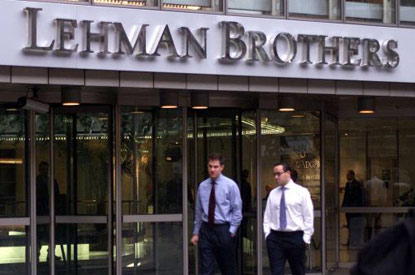India has every reason to cheer
 Mansoor Ali Khan is smiling again. He is once again dreaming of taking his parents on a vacation to Europe.
Mansoor Ali Khan is smiling again. He is once again dreaming of taking his parents on a vacation to Europe.
Hope is making a cautious comeback a year after the collapse of iconic US investment bank Lehman Brothers triggered a free fall in stock markets worldwide and overnight turned people like Khan, a 31-year-old sub-broker, from aspiring millionaires to debt-laden near-paupers.
A vicious cycle of home loan defaults in the US, banking collapses – Lehman Brothers, the world’s two largest home loan givers Freddie Mac and Fannie Mae, and AIG, the world’s largest insurer, went bust in September 2008 – massive job losses and bankruptcies combined to create conditions akin to the Great Depression of 1929.
Indian companies felt the pinch as cash-strapped western companies cut back on imports and fearful consumers worldwide and in India tightened their purse strings. Export growth turned negative in October– a trend that continues till date.
Result: Sales dipped, margins shrank and profits all but vanished.
The BSE Sensex fell from 14,001 on September 12, the last trading day before the Lehman collapse, to a 2008 low of 8,510 on October 27.
It remained volatile for the following five months, dipping further to 8,198 on March 5, this year before a sustained rally set in. On Monday, it closed at 16,214.
The worst sufferers of the economic downturn were those who lost their jobs. And people like Khan, whom Hindustan Times had profiled when the market tanked last September, suddenly lost everything he had – money, goodwill and respect. European holidays seemed as remote as a distant planet.
The fall was so dramatic that Khan – a broker’s agent, traditionally the weakest link in the stock market food chain – had no idea how to hedge his risks.
“I had bought shares of all kinds of companies, never caring to even check their fundamentals,” said Khan, sitting in his tiny first floor office above his father’s 40-year-old shoe shop in Mumbai’s Chembur area.
He found himself Rs 20 lakh in debt as clients whose orders he had executed refused to pay.
This was a huge amount for the short, bespectacled sub-broker, who made his debut in the market a year before that, when the Sensex was around 17,200 and rising.
But Khan soldiered on, partly because he had no choice. “Most of my clients were family and friends,” he said, adding: “I survived the past year with their help. My biggest achievement was to persuade them to stay the course and not sell out at a loss. I knew the market would bounce back.”
Now, he senses a turnaround. “Investors are returning to the market, but cautiously,” said Khan.
The Indian economy grew at 6.7 per cent in 2008-09 even though some sectors such as exports, real estate, IT, etc. suffered.
The story got better in the April-June 2009 period. The economy expanded 6.1 per cent, a tad higher than the figure of 5.8 per cent in the preceding quarter (this was, however, lower than the 7.8 per cent growth in the previous corresponding quarter).
Then, the Manmohan Singh-led UPA government returned to power in May – without the Left baggage that had hobbled its reformist zeal during its first term – further bolstering the feel good factor that had begun to permeate through the gloom.
Market sentiment bears this out. FIIs, which had pulled out $11.9 billion (Rs 57,120 crore) in the wake of the financial crisis in their home markets, are back with a bang. They have already pumped $8.7 billion (Rs 41,760 crore) into the Indian stock markets this year, and show no signs of slowing down.
“Confidence is returning to the market. The pace of hiring is also picking up,” said Divyesh Shah, CEO of Indiabulls, a leading brokerage firm.
Khan, of course, is dreaming big again. “I have cut most of my losses,” he said. The downturn-induced bear phase has also proved to be a good teacher. “It was the experience of a lifetime. It has made me wiser and taught me how not to fall to greed.”
Now, he is tempering his dreams with a heavy dose of realism. The European vacation is back on his radar, but unlike last year, he doesn’t aspire to buy a car and take his family to Mecca all at once.
Those will come, he said, "but my priority now is to launch my own broking firm".
Khan realises that rising inflation – and efforts to tame it – can still spoil the party, but he’s hopeful that it won’t come to that.
Policy makers and millions of people around the world will also be hoping for the same.